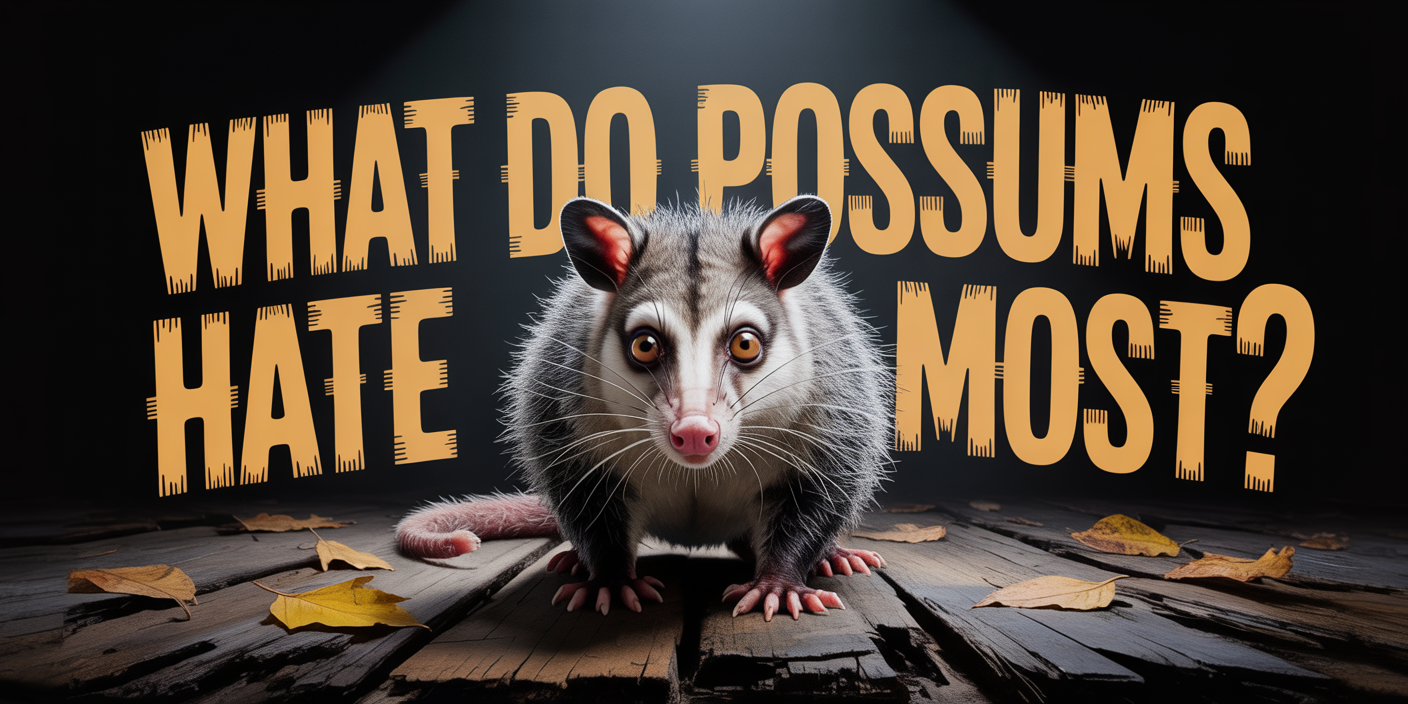“Possums hate anything that overwhelms their senses—sharp odors like ammonia or garlic, sudden bursts of bright light, and noises or scents that hint a predator is nearby. Put those three triggers together and they’ll bolt for the nearest tree instead of hanging around your porch. Make your yard smell pungent, flash unexpectedly, and echo with a bark, and possums will decide it’s not worth the risk.”
If you’re dealing with late-night rustling, tipped-over trash bins, or surprise visits to your porch, you’re not alone. Possums are common visitors across Florida’s Treasure Coast thanks to our warm climate, plentiful trees, and easy access to food and shelter. While they’re generally harmless, their presence can create a mess, disturb pets, and even damage parts of your home if they find a cozy hiding spot in your attic or under your deck. That’s when it’s time to call AAAC Wildlife Removal for expert possum removal.
The good news? Possums are pretty easy to discourage once you know what they hate. These nocturnal critters are sensitive to strong smells, sudden lights, unfamiliar noises, and anything that resembles a predator. In this guide, we’ll break down exactly what possums can’t stand, so you can use those aversions to keep them away from your home and yard—for good. If the situation becomes overwhelming, our possum removal services can safely and effectively handle the problem, keeping your home secure from these unwelcome visitors.
Learn more: What does it mean when a possum hangs around your house?
Why Are Possums a Problem on the Treasure Coast?
The Treasure Coast is a paradise for people—and unfortunately, for possums too. With its mix of suburban neighborhoods, wooded areas, and year-round warmth, it offers the perfect blend of shelter, food, and water that these opportunistic animals love. Possums often find easy meals in pet food bowls, unsecured trash cans, compost piles, and fruit trees, making your backyard feel like an open buffet.
Homeowners across Port St. Lucie, Stuart, Vero Beach, and nearby towns have reported possums nesting under decks, inside sheds, or even squeezing through attic vents. While they aren’t aggressive, their scavenging habits can lead to torn screens, scattered garbage, and even flea infestations. If left alone, a single possum visit can turn into a regular nightly route—so it’s important to act quickly and make your property as uninviting as possible.
What Smells Do Possums Hate the Most?
Possums rely heavily on their sense of smell, which makes strong odors one of the best ways to send them packing. On the Treasure Coast—where fruit trees, pet food bowls, and open trash cans are easy targets—targeting their noses is a smart and natural approach to wildlife control.
Ammonia: Smells Like Trouble
Ammonia mimics the scent of predator urine, which instantly signals danger to a possum. Soaking rags or cotton balls with ammonia and placing them in suspected entry points or nesting areas can help repel them effectively. Just make sure it’s kept out of reach from pets and kids.
Garlic and Vinegar: Kitchen Staples That Work
Garlic and vinegar are both pungent, overwhelming, and easy to find in your pantry. You can crush garlic cloves or mix vinegar with water to spray around your garden or trash bins. These scents create an invisible barrier that possums typically avoid.
Camphor and Menthol: Medical-Grade Deterrents
Possums dislike strong medicinal smells like camphor and menthol. These are commonly found in products like vapor rubs or mothballs (use with caution). Place them near sheds, attics, or porch corners where possums might try to settle.
Spicy Deterrents: Turn Up the Heat
Hot pepper sprays, chili flakes, or crushed red pepper are spicy irritants that sting a possum’s nose and mouth. Sprinkle these around garden beds, planters, or entry points to make the area less inviting. Just be sure to reapply after rain.
Dog or Cat Presence: Natural Predator Scent
The scent or sound of a dog or cat is often enough to keep possums at bay. If you have pets, their presence alone can discourage visits. You can also buy predator scent granules or sprays at your local garden or hardware store for extra coverage.
Do Possums Hate Lights and Noise?
Possums are strictly nocturnal, so they prefer dark, quiet areas where they can move undisturbed. That’s why motion-activated lights are such a reliable deterrent. A sudden burst of brightness can startle them enough to make them flee and avoid the area altogether. These lights work best when placed near sheds, entry points, trash bins, and fruit trees—anywhere a possum might sneak by after dusk.
Noise is just as effective. Radios, barking dogs, or ultrasonic devices can all create an environment that feels too risky for a possum to settle into. On the Treasure Coast, many homeowners have success using battery-powered radios in attics or under decks to create consistent background noise that disrupts a possum’s sense of safety. When paired with light deterrents and scent-based strategies, these sensory triggers can help you reclaim your space fast.
Are There Natural Predators That Scare Possums?
Possums are naturally cautious animals that avoid anything resembling a threat. The smell or sound of a dog or cat is often enough to make them steer clear of a yard or porch. If you have outdoor pets, their presence alone can do a lot of the work for you. Possums pick up on scent trails and noise, so even a curious dog sniffing around the fence line can signal, “Not a safe place.”
In the wild, possums are prey for several animals, and their instincts tell them to avoid areas where these predators might be. Here are the most common ones that scare possums:
- Dogs
- Cats
- Foxes
- Coyotes
- Owls
- Hawks
- Bobcats
- Snakes (in some regions)
If you don’t have pets, you can mimic predator presence by using scent granules or sprays made with fox or coyote urine. These are easy to apply near fences, decks, or garden beds—and they’re especially helpful in neighborhoods around the Treasure Coast where natural predators are less visible but still effective in spirit.
What Surfaces or Textures Do Possums Avoid?
Possums are nimble climbers, but they’re not fans of unstable, sharp, or uncomfortable surfaces. That’s why many homeowners use bird spikes, chicken wire, or aluminum foil to block access to common possum pathways. These textures make it hard for them to walk or climb comfortably, especially around fences, railings, and rooflines. The goal is to make travel awkward and uninviting without harming the animal.
You can also use materials like crushed eggshells, pine cones, or gravel mulch around garden beds or crawlspaces. These natural textures irritate their paws and make for unpleasant ground cover. On the Treasure Coast, adding these physical barriers under decks, along roof eaves, or near citrus trees can work alongside scent and sound deterrents to create a multi-layered defense that possums won’t want to challenge twice.
What Habits Will Keep Possums Away From Your Home?
Even the strongest deterrents won’t work for long if your home still looks like a buffet. Possums are scavengers by nature, and on the Treasure Coast, they’re drawn to anything edible left around your home. To get rid of possums effectively, trash bins should be tightly sealed, pet food must be brought in at night, and fallen fruit should be removed regularly. If you’re offering up anything possums eat—like leftovers, compost scraps, or fruit—they’ll keep showing up no matter how much you try to deter possums.
Along with removing food sources, focus on access points. Trimming tree branches that touch your roof or fence is essential, since possums are agile climbers. They’ll use those limbs to reach your attic, crawlspace, or roofline. Keep firewood stacks, storage bins, and overgrown vegetation off the ground and away from walls to eliminate hiding spots. These small changes around your home can go a long way in stopping curious possums from moving in.
Should I Use Commercial Possum Repellents?
Commercial repellents can help, especially when you’re dealing with a recurring issue. These products often come in the form of sprays, granules, or electronic deterrents, and they’re designed to irritate a possum’s senses—mainly smell and hearing. On the Treasure Coast, where humidity is high and rain is frequent, it’s important to choose weather-resistant formulas and reapply them as needed to maintain effectiveness.
That said, not all repellents are created equal. Some are labeled for general wildlife but don’t do much against possums specifically. Others may contain ingredients that aren’t safe for pets or small children. Always check the label and aim for eco-friendly, non-toxic options if your pets roam outdoors. When in doubt, it’s worth consulting with a wildlife control professional to avoid wasting money on products that don’t actually solve the problem.
When Should You Call a Wildlife Control Company?
If possums keep returning no matter what you try, it’s time to bring in the pros. While possum deterrents, lights, and DIY tricks might help for mild cases, a persistent possum problem often points to deeper issues—like a hidden den or easy access points around your property. On the Treasure Coast, where thick landscaping and humid conditions create perfect hiding spots, it’s smart to get a professional involved before a minor nuisance turns into a full-blown infestation.
A licensed pest control and wildlife control company like AAAC Wildlife Removal of Treasure Coast understands how to deal with these local nuisance animals quickly and humanely. They’ll assess entry points, remove the possum safely, and put long-term prevention in place to keep them from coming back. If you’re spotting droppings, hearing attic noise, or seeing damage to your home, don’t wait—acting early can save you time, money, and stress.




